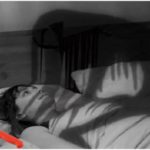Sleep Paralysis: Unraveling the Mystery Behind This Disturbing Phenomenon
For centuries, sleep paralysis has been a source of intrigue and fear, often associated with supernatural forces or mysterious causes. Now, science sheds light on this phenomenon, offering insights into its nature and providing strategies for those affected.
Demystifying Sleep Paralysis: A Scientific Perspective
Sleep paralysis is a sleep disorder that affects a significant portion of the population. It involves a temporary inability to move or speak while falling asleep or upon waking, with full consciousness. This condition is not uncommon, affecting approximately 4 out of 10 people at some point in their lives, particularly those aged 20 to 30. However, it can occur at any age, with initial episodes possible during the teenage years.
According to the American Sleep Medicine Institute, genetics plays a role in sleep paralysis. If a family member has experienced this condition, you may be at a higher risk.
During an episode of sleep paralysis, the individual remains conscious, but their body is temporarily paralyzed. This occurs when the brain awakes from sleep while the body is still in a state of paralysis, a natural occurrence during the REM (rapid-eye movement) stage of sleep. This disconnect between the brain and body can be a terrifying experience, leaving the person unable to move or speak, yet fully aware of their surroundings.

Unraveling the Causes of Sleep Paralysis
To understand sleep paralysis, it’s essential to delve into the sleep cycle. Sleep consists of five stages: drowsiness, light sleep, deep sleep, very deep sleep, and REM sleep. These stages form a cycle that repeats itself throughout the night.
The first four stages are collectively known as ‘quiet sleep’, while the REM stage is classified as ‘active sleep’. During REM sleep, the brain is highly active, and dreams occur. Importantly, the body also undergoes muscle atonia, a state of temporary paralysis, to prevent physical acting out of dreams.
Sleep paralysis occurs due to an unusual overlap between the REM stage and the waking state. Typically, during REM sleep, the brain is unconscious, and the body is paralyzed. However, in sleep paralysis, the brain remains conscious while the body is still in a state of paralysis.
This unique combination of consciousness and paralysis can lead to intense dreams or hallucinations. The individual may feel as if they are awake and experiencing a threatening situation, unable to move or speak. Additionally, the paralysis can affect breathing, causing a sense of breathlessness or pressure on the chest.
Dr. Clete Kushida of the Stanford Sleep Medicine Center in Redwood, California, suggests that sleep paralysis may also be a symptom of certain mental disorders. Individuals with psychological trauma, depression, or bipolar disorder, for example, often experience a higher frequency of sleep paralysis. Furthermore, stress, irregular sleep patterns, and substance use can also contribute to this phenomenon.
Who is Prone to Sleep Paralysis?
Sleep paralysis can affect individuals with certain vulnerabilities or life circumstances, including:
- Those who are physically weak or recovering from illness, often described as “weak-nerved” in folk beliefs.
- People with irregular sleep patterns, such as shift workers or those who frequently use stimulants or narcotics.
- Individuals with obstructive sleep apnea, a condition where breathing repeatedly stops and starts during sleep. Over 38% of those with sleep apnea experience temporary paralysis while sleeping.
- Those who stay up late, suffer from chronic insomnia, or sleep with their hands on their chest, restricting breathing, may also be prone to sleep paralysis.
- People with narcolepsy, a chronic sleep disorder characterized by excessive daytime sleepiness and sudden attacks of sleep.
Navigating Through Sleep Paralysis
While sleep paralysis is not a disease, frequent and severe episodes can impact your quality of life. If you experience associated conditions such as anxiety, insomnia, or depression, it’s crucial to seek professional help. However, for most people, adopting a healthier lifestyle can help prevent or reduce the occurrence of sleep paralysis.
Here are some strategies to consider:
- Maintain a consistent sleep schedule, going to bed and waking up at the same time each day.
- Practice relaxation techniques before bed, such as deep breathing or meditation, to calm the mind and body.
- Ensure your bedroom is comfortable and well-ventilated, with a comfortable temperature and minimal distractions.
- Focus on moving your toes or fingers during an episode. Even slight movement can help break the paralysis.
- Pay attention to your breathing. Deep, controlled breathing can reduce chest discomfort and help manage fear.
- Resist the urge to struggle against the paralysis. Instead, try to relax and remind yourself that the experience is temporary.
- Think of a loved one or a respected figure, or recite a prayer or mantra. This can provide a sense of comfort and protection.
- Consider practicing yoga, tai chi, or meditation to improve mental resilience and reduce the impact of negative emotions.
Additionally, some folk remedies, such as placing an iron knife or garlic under the bed, may provide a psychological boost and lead to improved sleep. While these practices may not have a direct impact on sleep paralysis, they can enhance your sense of security and promote deeper sleep.
Lastly, consider applying feng shui principles to your bedroom to reduce negative energy and create a more harmonious space. Avoid placing large pictures above your bed, and position your bed away from direct alignment with the door or windows.
The information in this article is for educational purposes only and should not be considered medical advice.
Does Keeping Knives by the Bedside Affect Feng Shui?
The practice of keeping cutlery by the bedside is not a prudent habit. It is imperative to understand that this seemingly innocuous habit can have unforeseen consequences. While it may seem convenient to have easy access to these utensils, there are far safer and more practical alternatives to consider.
Is it beneficial to place a knife by the bedside to ward off evil spirits and ensure a good night’s sleep? Beware of feng shui taboos that may bring bad luck.
Many people believe in the power of folk remedies to ward off evil spirits and protect themselves from supernatural entities. One popular practice that has been passed down through generations is the tradition of placing a knife or a sharp object at the head of the bed. This act is believed to keep evil forces at bay and ensure a peaceful sleep. While the effectiveness of this practice is subjective, it continues to be embraced by those seeking additional protection and a sense of security.



































